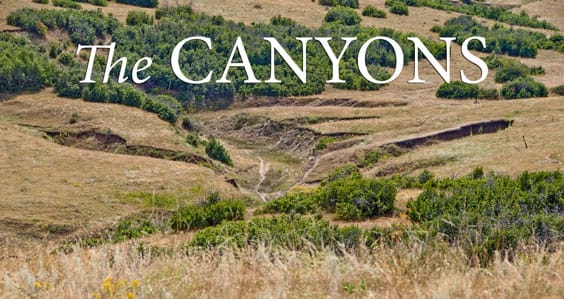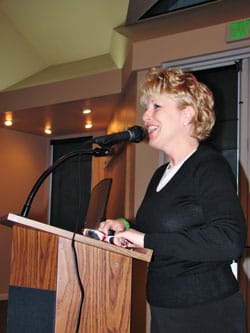City seeks Urban Renewal Authority for Castle Pines North

This greenfield space of The Canyons property was annexed into the City of Castle Pines North in October 2009, and is one area city council is considering in a “blight” study for the city. The blight study is a requirement for the city to be able to establish an Urban Renewal Authority (URA). If established, the URA would have the ability to condemn areas such as this (and any agreements pertaining to the land) and rezone and/or redevelop at the URA’s discretion.
By Elizabeth Wood West
The City of Castle Pines North (CPN) City Council is moving toward establishing an Urban Renewal Authority (URA), and is scheduled to vote on the issue at its April 27 meeting. Once established, council will vote on the plan May 25, just one week before new legistation relating to URAs goes into effect.
Residents, including current and former city council memebrs and city staff, filed a petition with the city stating “…due to blighted or slum areas within the city, there is a need to create an urban renewal authority….”
What is a URA and how does it work?
Colorado municipalities have utilized URAs for years to address blighted and slum areas and to promote redevelopment in communities. A URA can acquire any property within its boundaries by different means, including condemnation, for the purpose of economic development. URAs can also set up tax increment financing (TIF), which is a tool to use future gains in taxes to finance current improvements.
URA concerns on a legislative level
Anne Ricker of Leland Consulting Group presents information to city council members regarding urban slum and blight, and how an Urban Renewal Authority (URA) can be utilized within a municipality. The city hired Leland Consulting Group to conduct a blight study (which includes all CPN commercial/retail property – including the CC-20 property at Monarch and Castle Pines Parkway, three Douglas County commercial lots – at I-25 and Castle Pines Parkway, and The Canyons’ 3300-acre mixed-use development) and to assist with forming a URA for the city. Leland Consulting Group’s contract fees are estimated to be between $15,000 and $17,000, part of which may be paid by The Canyons.
Inappropriate applications of URAs have come under fire recently, resulting in the passing of State House Bill 1107, which goes into effect June 1.
According to the Bill’s author, State Representative Randy Fischer, the definition of “urban blight” contained in Colorado URA laws has major problems. “It turns out that municipalities have complete and total authority to designate almost any piece of property, including productive agricultural land, as ‘urban blight,’” stated Fischer. “This ‘blight’ designation is required to establish a URA and to reap the lucrative subsidy known as tax increment financing or TIF.”
Fischer continued, “TIF essentially uses other people’s tax dollars to subsidize new development. Under our URA statutes, a city may declare an area as urban blight and then include the properties in that area in a URA.” According to Fischer, the increase in property tax dollars that accrue as a result of the increase in the land’s value during its conversion from blight to new development goes to the developer as a direct subsidy.
Anne Ricker of Leland Consulting Group presents information to city council members regarding urban slum and blight, and how an Urban Renewal Authority (URA) can be utilized within a municipality. The city hired Leland Consulting Group to conduct a blight study (which includes all CPN commercial/retail property – including the CC-20 property at Monarch and Castle Pines Parkway, three Douglas County commercial lots – at I-25 and Castle Pines Parkway, and The Canyons’ 3300-acre mixed-use development) and to assist with forming a URA for the city. Leland Consulting Group’s contract fees are estimated to be between $15,000 and $17,000, part of which may be paid by The Canyons.
“Tax dollars that were approved by the voters to fund our schools, county government, fire departments, and first-responder agencies are diverted to private development interests with no transparency or accountability,” Fischer said.
Fischer added further, “House Bill 1107 is designed to put the brakes on the exponential growth in the state’s backfill of local school revenues that are being siphoned off through TIF. At a time when the state legislature is being forced to cut over $2 billion in state spending, this loophole costs Colorado taxpayers over $50 million per year. Alarmingly, the high growth rate in the state’s share of TIF back-fill could end up costing the state over $200 million by 2020,” said Fischer.
Local concerns; a look at the bigger picture
In a letter to the CPN City Council dated March 3, the Douglas County Board of County Commissioners (BOCC) expressed its concerns about the city’s URA plans:
“The [BOCC] wishes to apprise the City’s leadership regarding the impact the URA may have on the success and sustainability of Douglas County, the Douglas County School District, and the Public Library District. We have particular interest in the application of the URA to any ‘greenfield’ areas.”
The BOCC continued, “As you may be aware, the use of the tax increment financing provision of the URA can be highly detrimental to the financial stability of institutions now serving the citizens of Castle Pines North. We also, of course, have concerns regarding the impact to Douglas County, in particular the Douglas County Sheriff’s Office, that we would like to share with you.”
The BOCC added, “The [BOCC] has also been recently made aware that formation of the URA may in some way be intended to affect the existing covenant between the Happy Canyon subdivision and landowners of The Canyons’ project. We continue to believe that this issue is best addressed by direct negotiations between the parties which should include both County and City officials.”
The Happy Canyon HOA and The Pinery HOA have a private agreement with The Canyons’ owners, which was signed and filed with the Douglas County Clerk in 2001. The agreement provides protections for open space and limits the [Canyons] development’s commercial and residential density. Dozens of HOAs and referral agencies participated in providing input that helped shape The Canyons’ 2000 Planned Development (PD). As of press time, city officials had not met with the BOCC or the neighboring HOAs regarding concerns. The president of the Happy Canyon HOA submitted a “letter to the editor” regarding the HOA’s concerns.
(Editor’s Note: The city’s annexation agreement with The Canyons states that if the HOA agreement [between Happy Canyon HOA/Pinery HOA] is terminated or amended such that the property can be developed substantially in accordance with the maximum entitlement shown on the PD plan, then the Owners [The Canyons] will pay the city $1,000,000. When presented with written concerns that CPN officials might be pursuing the URA for the wrong reasons, NO members of city council NOR city staff replied to The Castle Pines Connection’s request for response.
Checks and Balances
As in the establishment of most boards, authorities, and even government entities, there are “checks and balances” built into place to ensure protections from the abuse of unlimited power.
With a URA, those checks and balances come in the form of 1) the citizen’s group who spearheads the effort and brings forth the petition to council for consideration; 2) the planning commission of the municipality who reviews the plans; 3) city council representatives who vote on establishing the URA; and 4) the URA itself.
(Editor’s Note: More than half of the required signatures on the Citizen’s Petition to establish the URA were either current or former city council members or their spouses, or city staff members or their spouses. Also of note is the fact that the City of CPN city council also serves as the Planning Commission for the city. And finally, the city council has the ability, once it approves the URA, to appoint themselves as the URA.)
Moving Forward – A fast track to establish a URA
As of press time, city council was set to vote on a resolution to create a URA and to designate themselves as the URA at its April 27 city council meeting. Leland Consulting Group was scheduled to make a presentation of the URA plan to city council during the council study session on May 11, with another presentation to the taxing authorities being planned for mid-May.
A public hearing is scheduled for May 25, when city council will determine if it will vote to adopt the URA plan.
For additional information and updates, go to www.CastlePinesConnection.com.